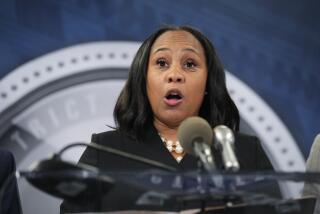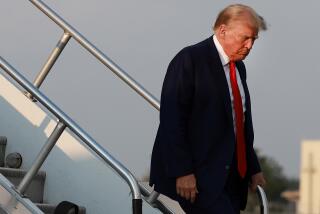Walsh to Try North First but He Proposes 2 Joint Trials
- Share via
WASHINGTON — Independent counsel Lawrence E. Walsh said Thursday that he will try fired White House aide Oliver L. North first if the federal judge presiding over the Iran-Contra conspiracy case stands by his earlier ruling that all four defendants must have separate trials to protect their constitutional rights.
But Walsh urged in legal papers that U.S. District Judge Gerhard A. Gesell reconsider his Wednesday ruling and he proposed a novel plan for two joint trials involving four juries. This would allow the jurors to see more than just one defendant, an advantage for prosecutors trying to prove a complicated conspiracy case.
Walsh would try North jointly with his one-time superior, former National Security Adviser John M. Poindexter, before two separate juries in the same courtroom. Later, Walsh said, the two private citizens in the alleged conspiracy, retired Air Force Maj. Gen. Richard V. Secord and an Iranian-born businessman, Albert A. Hakim, could be tried jointly in the same manner.
A Dual-Jury System
The prosecutor said a dual-jury system would afford pairs of defendants the same protections Gesell had sought: that each defendant could use another’s immunized testimony before Congress without violating the second man’s constitutional rights.
Under Walsh’s plan, for example, if North wished to use Poindexter’s immunized testimony for his own defense, the Poindexter jury would temporarily retire from the courtroom, and vice versa. This is because federal law provides that once Congress gives immunity from prosecution to a witness for what he might say, that immunized testimony cannot be used to prosecute him.
Walsh is prohibited from using any congressional testimony of North, Poindexter or Hakim in prosecuting them. Secord testified without immunity. Defendants, however, have the right to use immunized testimony, and Gesell said that separate trials are needed to protect that right.
Walsh said his proposal would save the government time and money by avoiding the needless duplication of four trials. Much of the prosecution’s case against North and Poindexter is identical, he said, and the same applies to Secord and Hakim.
A Benefit to Prosecution
Walsh’s plan also would contain a benefit to the prosecution that he did not mention, the advantage of joint trials. Legal experts say the prosecution’s case is often helped when defendants are tried together in conspiracy trials.
All four defendants were charged last March in a 23-count indictment with conspiring to defraud the government and misappropriating federal property by selling arms to Iran in 1985 and 1986 and diverting the profits to Nicaragua’s rebels. The defendants have pleaded not guilty to the charges.
“The defendants, the government and the court share a common interest in ensuring that the charges against each of the four defendants are tried in an expeditious, fair and efficient manner,” Walsh said.
“Four separate and sequential trials will result in at least some of the defendants’ living under the cloud of an indictment for several months,” he said, and the government “will be forced to incur the substantial expense” of four trials, including the cost of witnesses who must travel repeatedly to Washington to give the same testimony.
“Moreover,” Walsh said, “the public has its own interest in a speedy resolution of the charges against the defendants which may not be met if these cases are permitted to extend over a period of years.”
Gesell made no immediate ruling on Walsh’s proposal, pending a response by the defendants. The judge also has been considering arguments by the defense that problems relating to immunized testimony may make a fair trial impossible, as well as needs cited by the defendants to obtain more classified government documents to help defend themselves.
More to Read
Get the L.A. Times Politics newsletter
Deeply reported insights into legislation, politics and policy from Sacramento, Washington and beyond. In your inbox twice per week.
You may occasionally receive promotional content from the Los Angeles Times.










